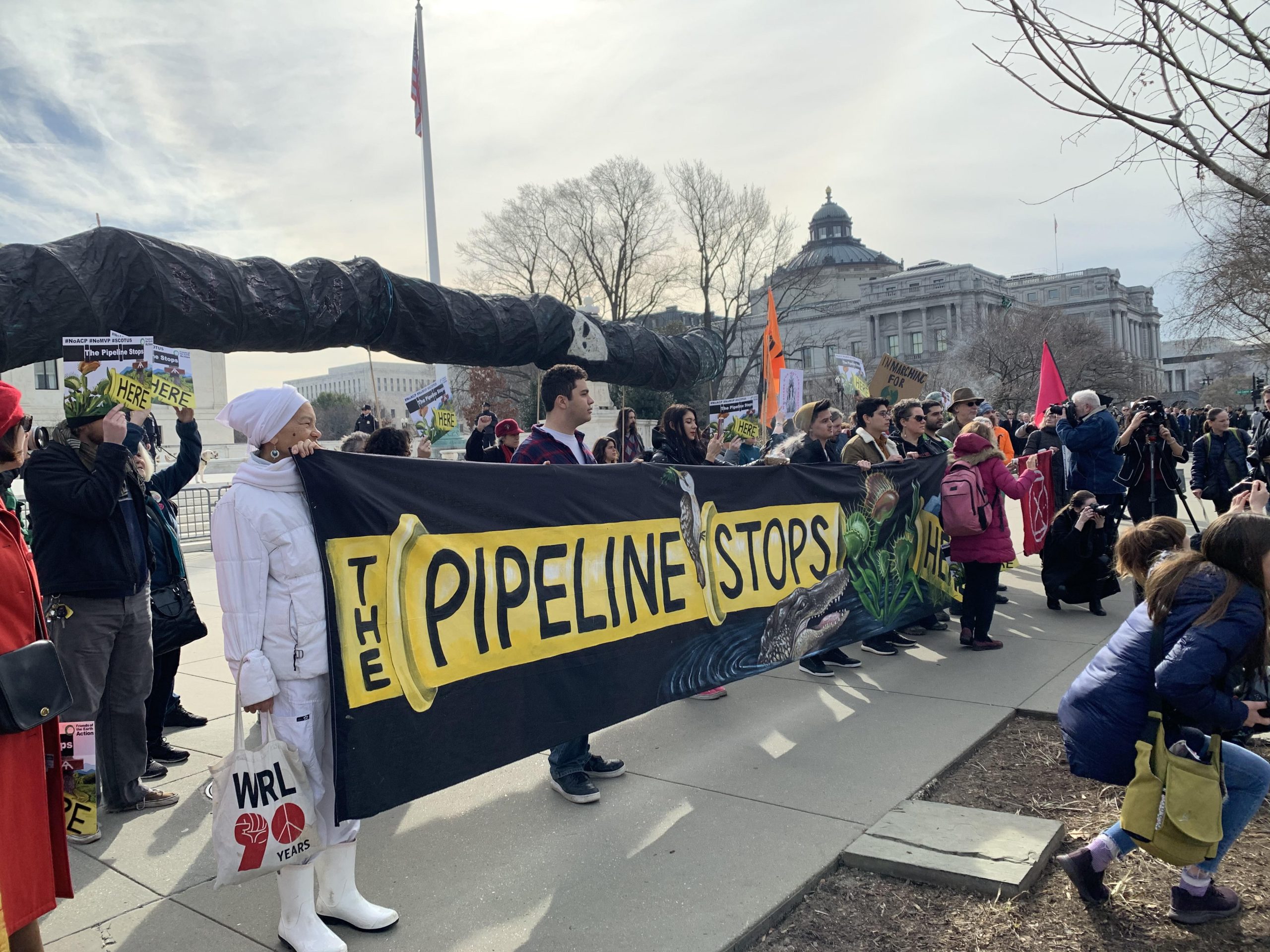Case Preview
Eminent domain, sovereign immunity and a controversial pipeline through New Jersey

on Apr 27, 2021 at 1:46 pm

On Wednesday, the justices will hear argument in PennEast Pipeline Co. v. New Jersey. The case presents the question of what impact, if any, does the Natural Gas Act have on the sovereign immunity provided to the states through the 11th Amendment. This clash between the NGA and the Constitution arose because, under the NGA, companies with permits to build new pipelines can use the power of eminent domain to seize property along the pipeline route. The case has broad ramifications for the industry because it may affect the extent to which states can block pipeline construction within their borders.
Factual and legal background
PennEast’s quest to construct a new pipeline to serve markets in the eastern United States started in 2014 when the Federal Energy Regulatory Commission began its pre-submission environmental review of the proposed pipeline. In 2015, with the environmental review still pending, PennEast submitted a formal application to construct and operate the pipeline, and in 2018, following staff review, the commission issued the requested “certificate of public convenience and necessity” – a permit authorizing the company to proceed with a 116-mile natural-gas pipeline through Pennsylvania and New Jersey.
New Jersey, which opposes the pipeline, challenged the issuance of the certificate before FERC by requesting a rehearing, which was ultimately rejected. Then, as required by the NGA, the state raised its objections before the U.S. Court of Appeals for the District of Columbia Circuit.
However, before FERC had issued a final order in response to New Jersey’s objections to the issuance of the certificate, PennEast initiated multiple eminent domain proceedings in federal district court against properties that New Jersey had either been granted easements for or owned outright. PennEast sought to use the power of eminent domain to condemn and seize land that it needs for the pipeline. The D.C. Circuit decided to put the challenge to the certificate on hold until the proceedings in district court were resolved. Meanwhile, New Jersey responded to the eminent domain suits by asserting that it was not subject to such suits in federal court pursuant to the 11th Amendment, which makes states generally immune from lawsuits in federal court brought by parties other than the federal government.
The district court rejected New Jersey’s assertion of sovereign immunity, finding that “PennEast has been vested with the federal government’s eminent domain powers and stands in the shoes of the sovereign.” Accordingly, the sovereign immunity provided to states by the 11th Amendment did not shield New Jersey from the condemnation proceedings initiated by PennEast in federal district court.
New Jersey appealed to the U.S. Court of Appeals for the 3rd Circuit and asserted once again that PennEast’s condemnation suits were barred by sovereign immunity. PennEast responded by arguing that the ability to initiate eminent domain proceedings in federal court against a state naturally flowed from the delegation by Congress in the NGA of the federal government’s eminent domain power. “To conclude otherwise,” the company argued, “would frustrate the fundamental purpose for the NGA to facilitate interstate pipelines.”
The 3rd Circuit agreed with New Jersey and found that, while the NGA may have delegated the federal government’s power of eminent domain to private parties, the question of New Jersey’s sovereign immunity from suits in federal court was an entirely separate and distinct matter:
Thus, the federal government’s ability to condemn State land … is, in fact, the function of two separate powers: the government’s eminent domain power and its exemption from Eleventh Amendment immunity. A delegation of the former must not be confused for, or conflated with, a delegation of the latter.
According to the 3rd Circuit’s analysis, there were three fundamental flaws with PennEast’s claim that the NGA delegated not only the power to use eminent domain when necessary but also delegated the federal government’s exemption from state assertions of sovereign immunity. First, there was no case law supporting the “delegation” theory of sovereign immunity. Second, distinctions between suits brought on behalf of the federal government and suits brought by private parties raised doubts that Congress could also delegate to private parties the federal government’s exemption from state sovereign immunity claims. Third, acceptance of PennEast’s position “would undermine the careful limits established by the Supreme Court on the abrogation of State sovereign immunity.” Consequently, the 3rd Circuit vacated the lower court’s condemnation orders against New Jersey and directed the district court to dismiss PennEast’s eminent domain cases.
PennEast petitioned for Supreme Court review, and the justices agreed in February to hear the case. The initial question posed to the court was “whether the NGA delegates to FERC certificate holders the federal government’s eminent domain power to condemn land in which a state claims an interest.” The court, however, in granting the petition also asked the parties to address whether the 3rd Circuit had properly exercised its jurisdiction to hear the case in the first instance.
PennEast’s arguments
The heart of PennEast’s argument is that, under fundamental principles of statutory construction, there is no doubt that the NGA authorizes eminent domain actions by certificate holders against private property owners as well as against states that may own property along the route of a new pipeline. PennEast stresses that there are no exceptions in the NGA eminent domain provision for state-owned properties, and it contrasts and compares the NGA eminent domain provision with other instances where Congress provided specific exceptions when it delegated the federal power of eminent domain, such as the express carve-outs for state-owned properties that exist in the eminent domain provisions of the Federal Power Act.
It then tackles what it terms the 3rd Circuit’s “double barreled ‘clear statement’ rule,” which PennEast characterizes as requiring the delegation by Congress of two things with “unmistakable clarity” before a private party can initiate an eminent domain proceeding in federal court against a state property owner: (1) the federal eminent domain power and (2) the federal government’s exemption from 11th Amendment sovereign immunity.
PennEast contends that the 3rd Circuit’s analysis is flawed from a historical perspective because states consented to federal eminent domain at the Founding and thus “sacrificed immunity from the federal government’s eminent domain power” as part of the agreement to form a union with a centralized federal government. Thus, “[t]o ask for a clear abrogation of sovereign immunity in this context is to ask Congress to clearly abrogate something that was surrendered long ago in the plan of the convention.”
PennEast also argues that there is a crucial distinction for purposes of sovereign immunity between a case where a state is haled into court and a condemnation suit brought pursuant to the delegation of the federal government’s eminent domain power. PennEast then asserts that the nature of a condemnation suit doesn’t actually “hale an unconsenting state into court, but rather hales the property into court.” As such, according to PennEast, effectuating the power of eminent domain through a condemnation proceeding implicates few, if any, of the concerns underpinning the adoption of state sovereign immunity in the 11th Amendment.
PennEast’s final argument is that if the 3rd Circuit’s decision stands it will give states “a veto power over federally approved pipelines.” PennEast follows this with a summary of the adverse consequences that will follow unless the 3rd Circuit is reversed, including “thousands of jobs lost, millions of forgone tax revenues, and tens of millions in increased consumer costs.”
New Jersey’s arguments
New Jersey first highlights that the 11th Amendment prohibits private parties from suing a state in federal court and that prohibition includes no exceptions for condemnation suits. Here the state is quick to claim that the states couldn’t have expressly or implicitly consented to condemnation suits by private parties against a state at the Founding because such suits didn’t exist then: “PennEast cannot identify a condemnation suit involving state land until the turn of the 20th century … and the only known private condemnation action against a nonconsenting State (before the instant one) was dismissed by a federal district court in Texas four years ago.”
New Jersey also argues that, even after the Founding, it remained an open question for decades as to whether the federal government possessed the power of eminent domain. Thus, while accepted today that such power exists, the fact that it was in doubt for decades “undermines PennEast’s claim that the Framers understood private parties could exercise [eminent domain] against the States.”
Next New Jersey reconstructs PennEast’s delegation argument as a syllogism. As set out by New Jersey, the major premise is that the federal government and states have allowed private parties to file condemnation proceedings against private property owners; the minor premise is that at the Founding the states consented to suits by the federal government, including condemnation actions; and so it follows as the conclusion that the states must have consented to the federal delegation of its eminent domain power to allow private parties to initiate condemnation suits against states in federal court.
New Jersey then dismantles the syllogism by pointing out that private-on-private party litigation offers no evidence of consent by the states to suits by private parties in federal court. Then New Jersey contends that the consent by states to be sued by the United States also fails to demonstrate state consent to private suits, since the consent by states to be sued by the federal government was based on the understanding that the United States would be a party. Thus, even if a private party claims “delegated” authority conferred by the federal government, “the consent, ‘inherent in the convention,’ to suit by the United States — at the instance and under the control of responsible federal officers — is not consent to suit by anyone whom the United States might select.”
The federal government’s arguments
The federal government – which the Supreme Court invited to weigh in – sides with PennEast on the merits. It argues that the 3rd Circuit’s conclusion that sovereign immunity foreclosed PennEast’s eminent domain action was based on an incorrect reading of the NGA. The United States also agrees with PennEast that the power of eminent domain was understood before the Founding as a power that could be delegated by the federal government to private parties for projects deemed in the public interest.
The United States echoes the concerns raised by PennEast about the adverse impact that the 3rd Circuit’s approach would have on the natural gas industry, consumers, the ability of the Federal Energy Regulatory Commission to efficiently and effectively regulate, and the national economy if it is allowed to stand.
The jurisdictional question
Both PennEast and New Jersey believe that the 3rd Circuit properly exercised jurisdiction. The United States, however, disagrees. It argues that, under the NGA, any challenge to an authority granted in a pipeline certificate must be brought on “direct review” in the circuit court reviewing that certificate. Here, that court would have been the D.C. Circuit. As a result, the federal government says, the 3rd Circuit (as well as the district court) lacked jurisdiction to review New Jersey’s challenges to the use of eminent domain because those challenges were separate, collateral proceedings barred by the NGA. If the Supreme Court agrees that the 3rd Circuit lacked jurisdiction in the first instance, it may decide that error alone is enough to reverse and could forgo resolving the case on the merits.


